【最新】鲁教版九年级英语Unit1教材分析
鲁教九年级英语第一单元知识点
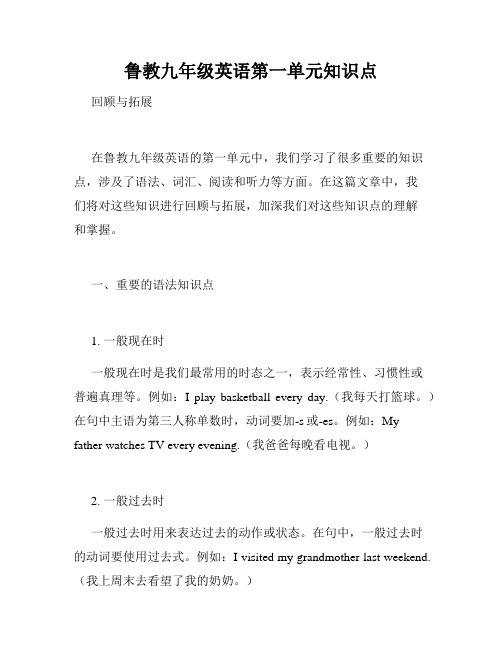
鲁教九年级英语第一单元知识点回顾与拓展在鲁教九年级英语的第一单元中,我们学习了很多重要的知识点,涉及了语法、词汇、阅读和听力等方面。
在这篇文章中,我们将对这些知识进行回顾与拓展,加深我们对这些知识点的理解和掌握。
一、重要的语法知识点1. 一般现在时一般现在时是我们最常用的时态之一,表示经常性、习惯性或普遍真理等。
例如:I play basketball every day.(我每天打篮球。
)在句中主语为第三人称单数时,动词要加-s或-es。
例如:My father watches TV every evening.(我爸爸每晚看电视。
)2. 一般过去时一般过去时用来表达过去的动作或状态。
在句中,一般过去时的动词要使用过去式。
例如:I visited my grandmother last weekend.(我上周末去看望了我的奶奶。
)3. 现在进行时现在进行时表示现在正在进行或发生的动作。
它的结构是“be + doing”。
例如:She is studying for her exam.(她正在为考试复习。
)二、积累的重要词汇1. 单词在第一单元中,我们学习了许多有用的单词,包括动词、名词和形容词等。
例如:homework(作业)、classroom(教室)、interesting(有趣的)等。
2. 短语短语的使用能够使我们的语言更加流利和自然。
在第一单元中,我们学习了一些常用的短语,例如:take a walk(散步)、in front of(在......前面)、at the moment(此刻)等。
三、提高阅读理解能力在阅读理解方面,我们需要不断提高自己的阅读速度和理解能力。
在第一单元中,我们练习了快速阅读和细节理解等技巧。
为了进一步拓展我们的阅读理解能力,我们可以阅读更多的英文原版书籍、新闻和杂志,同时,也要学会使用上下文的信息来推测词义和句子的含义。
四、加强听力技巧听力是英语学习中非常关键的一项技能。
九年级英语:Unit 1 What would you do(教案3)鲁教版
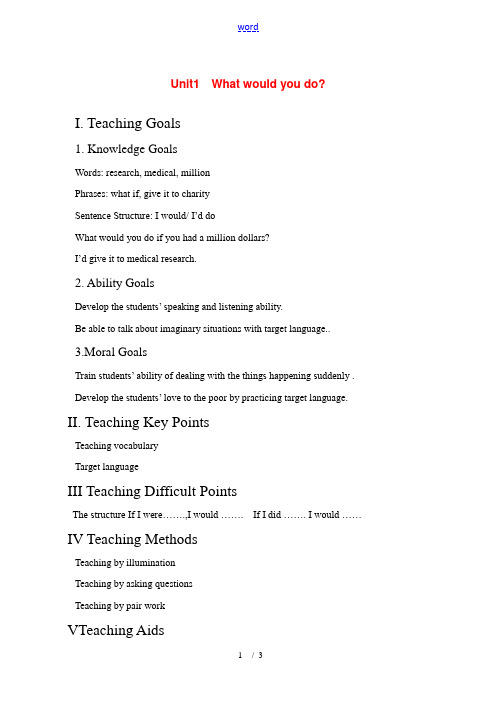
Unit1 What would you do?I. Teaching Goals1. Knowledge GoalsWords: research, medical, millionPhrases: what if, give it to charitySentence Structure: I would/ I’d doWhat would you do if you had a million dollars?I’d give it to medical research.2. Ability GoalsDevelop the students’ speaking and listening ability.Be able to talk about imaginary situations with target language..3.Moral GoalsTrain students’ ability of dealing with the things happening suddenly . Develop the students’ love to the poor by practicing target language. II. Teaching Key PointsTeaching vocabularyTarget languageIII Teaching Difficult PointsThe structure If I were…….,I would ……. If I did ……. I would ……IV Teaching MethodsTeaching by illuminationTeaching by asking questionsTeaching by pair workVTeaching AidsA tape recorder some pictures a puterVITeaching ProceduresStep I Greetings.Step II warm-up and lead inShow a picture in which a man won a lottery. Then ask students “What would you do if you had a lot of money?” First the teacher gives an example. “ I would give it to charity.” Let students work in pairs .After some minutes, ask several groups to say their ideas.Step III speaking practiceTask1 After share the ideas, teacher will give the new grammar and write it on the blackboard.wereIf subject ……….. subject would/should/could/might/……didThen show several pictures to practice target language. Students work in pairs . later the teacher checks.Task2 petitionThen make sentences as many as possible with the target language. Check and see which one gets the most sentences , give a prize.Step IV listening practice 1a 2a 2b1a The teacher explain the difficult points.Play the recording the first time. Students only listen.Play the recording a second time. Students number the pictures…Check the answers.Answers: 2 1 4 3.2a Ask the students to look at the picture. Ask, what is happening? (The boy is gettingready to go somewhere and he if feeling a little nervous. His sister is helping him pick out what to wear.) explain the difficult points.They play the recording the first time. Students only listen. Play the recording a second time. Students circle the reasons.Check the answers.Answers:The following items should be circled: 2 3 5.Then play the recording again. Ask the students to check the four things Larry’s sister says to him.Check the answers.Answers:The following answers should be checked: 1 2 4 5.Step V exercises.Give limited time then check in class.Step ⅥSummary and HomeworkSummarize what the students have learnt and give them some homework.If you had a large amount of money, for ¥100,000, example, what would you buy? Please write down each item and its cost to see when you will spend the full amount.。
鲁教版九年级英语Unit1 section B1 课件(28张PPT)
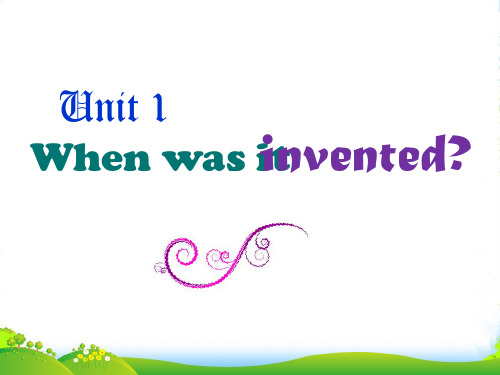
salad, lettuce, French fries salty
French fries, olives, pepperoni sour pickle, pineapple
Listen and circle T for true or F for false.
根据句意和首字母提示补全单词。
1. There were four famous inventions in a_n_c_ie_n_t_ China.
2. These cars were p_ro_d_u__c_e_d by the same company.
3. Few pears r_e_m_a_i_n_e_d_ on the trees after the heavy rain.
Unit 1
When was iitnvented?
Lead-in
Let’s listen to a music.
We love photo chips
Look and say
crispy
adj. 脆的;
酥脆的 Food that is crispy is pleasantly hard, or has a pleasantly hard surface. When roasted, the skin becomes crispy on the outside and juicy on the inside.
They were invented by a cook called George Grum.
When was that?
Make a conversation about the invention of potato chips. Use the information in 1c and 1d.
鲁教版九年级英语Unit1 第一课时课件

What are hot icecream scoop used for?
They’re used for serving for really cold ice-cream.
What are shoes with special heels used for?
They’re used for changing the style of the shoes.
Presentation
heel n. 鞋跟; 足跟
scoop n. 勺; 铲子
electricity n. 电; 电 能
style n. 样式; 款式
e.g. I like the style of the skirt. 我喜欢这条裙子的款式。
Listen and number the
2a inventions [1-3] in the
2d Role-play the conversation.
Hey Roy, the subject for my school project is “Small inventions that changed the wn.o项目rl;d工.程” Can you help me think of an invention?
When was the car invห้องสมุดไป่ตู้nted?
It was invented in 1885.
When was the TV invented?
It was invented in 1927.
When was the computer invented?
It was invented in 1971.
Invention
What is it / are they used for?
鲁教版英语九年级unit 1《when was it invented》sectionb 1a-2e优秀教案(重点资料).doc
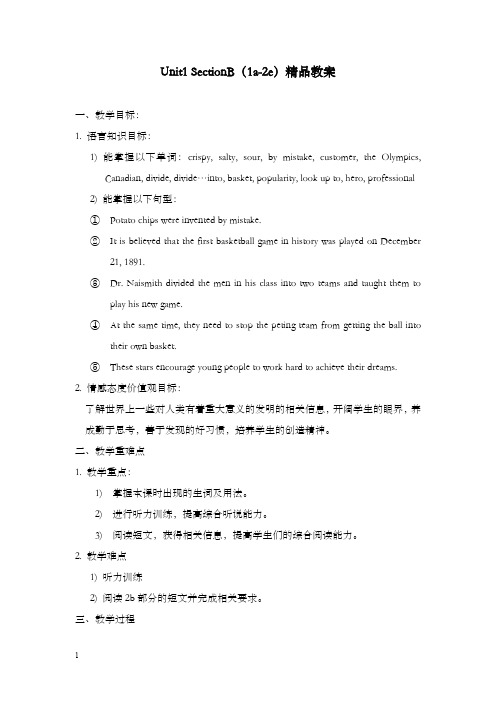
Unit1 SectionB(1a-2e)精品教案一、教学目标:1. 语言知识目标:1) 能掌握以下单词:crispy, salty, sour, by mistake, customer, the Olympics,Canadian, divide, divide…into, basket, popularity, look up to, hero, professional2) 能掌握以下句型:①Potato chips were invented by mistake.②It is believed that the first basketball game in history was played on December21, 1891.③Dr. Naismith divided the men in his class into two teams and taught them toplay his new game.④At the same time, they need to stop the peting team from getting the ball intotheir own basket.⑤These stars encourage young people to work hard to achieve their dreams.2. 情感态度价值观目标:了解世界上一些对人类有着重大意义的发明的相关信息,开阔学生的眼界,养成勤于思考,善于发现的好习惯,培养学生的创造精神。
二、教学重难点1. 教学重点:1) 掌握本课时出现的生词及用法。
2) 进行听力训练,提高综合听说能力。
3) 阅读短文,获得相关信息,提高学生们的综合阅读能力。
2. 教学难点1) 听力训练2) 阅读2b部分的短文并完成相关要求。
三、教学过程Ⅰ. Warming up1. Let Ss watch an interesting picture.2. Ask some questions about them.1. What did they eat?S1 Ice cream.2. What did the big dog think of the ice-cream?S2 Sweet, cool, and delicious!Well let’s look at some other delicious food, please.Ⅱ. TalkingWork on 1a1. Tell Ss that the words in the box describe how food can taste. Write them under the correct pictures. Some pictures have more than one word.2. Ss work with their partners and try to write some proper words under the pictures.3. Let some Ss read their answers. Try to remember the new words.Work on 1b1. Let some Ss read the adjective words in the box. Make sure they all know the meaningof each word.2. Ss discuss with their partners. Try to write the name of a different food after each word.Learn the new words togetherⅢ. ListeningWork on 1c1. Tell Ss the conversation is about how the potato chips were invented. The story is very interesting.2. First, let one Ss read the sentences in 1c. Make sure they know the meaning of each sentence.1. Potato chips were invented by mistake.2. They were invented in 1863.3. The customer thought the potatoes were not thin enough.4. The customer said they were not salty enough.5. George wanted to make the customer happy.6. The custom was happy in the end.3. Play the recording for the Ss. Listen for the first time. Play the recording again and judge T or F.Keys T, F, T, F, F, T4. Listen and answer the questions.1. Who invented potato chips?2. When were they invented?3. What did the custom order at the restaurant?4. What did the custom think of the potato chips George cooked at first?5. How did George cook the potatoes then?Work on 1d1. Let Ss read the article in 1d first. Tell Ss to listen again and fill in the blanks with the right words.2. Play the recording again for the Ss to listen and write the words.The History of Potato Chips[Do you know how potato chips were invented? Potato chips ____________ by a cook called George Crum. They were invented in ____.George Crum cut the potatoes really, really ____ and then cooked them for a long time until they were _____. Finally he put lots of salt on them so they were ____. Keys were invented, 1853, thin, crispy, really saltyⅣ. Pair work1. Work in pairs. Make a conversation about the invention of potato chips. Use theinformation in 1c and 1d.2. Ask some pairs to act out their conversation in front of the class.Ⅴ. DiscussionShow some pictures of playing basketball. Ask Ss some questions about b asketball games. Discuss the sport with your partner and share your ideas with the class.e.gT Do you like basketball? (What’s your favorite sport?)S1 Sure. I like it very much.T Do you watch basketball games?S2 Yes. I like to watch the NBA and CBA.T Do you know the history of basketball game?Ⅵ. ReadingFast ReadingTell Ss to read the passage quickly. And find the main idea of each paragraph.Keys 1. The main history of basketball.2. How the basketball was invented by James.3. The popularity of basketball around the world.Careful Reading1. T Now let’s read the mind map in 2c. Try to understand the meaning of the map. Ask Ss to plete the mind map with the information in the passageMind-mappingChanging the information you read into a mind map may help you remember it more easily.2. Ss read the passage carefully and try to fill in the mind map with the proper words. Developmentinvented by ______________first game on ________________became Olympic event in ______ in the year ______.most famous games _____popular games in China _____Gameplayed inside on a hard _____.____ teamsget _______ into other team’s ______.Popularityplayed by __________________ people.over ____ countries3. Check the answers with the class.4. Tell Ss to work hard and add something to the mind map.Encourage Ss to try their best.Post readingWork on 2d1. Now let’s work on 2d. First read the questions below. Then try to read the passage again and find the answers to the questions.2. Ss read the passage again and try to find the answers to the questions.1. Who invented basketball and how is it played?2. When was the first basketball game in history playe d?3. Why were the Berlin Olympics important for basketball?4. What are the professional basketball groups in America and China?5. How popular is basketball?3. Let some Ss read their answers and correct their mistakes.Ⅶ. Language points1. Potato chips were invented by mistake.by mistake 错误地;无意中e.g. Somebody took the my umbrella by mistake. 有人错拿了我的伞。
九年级英语第一 单元教材分析
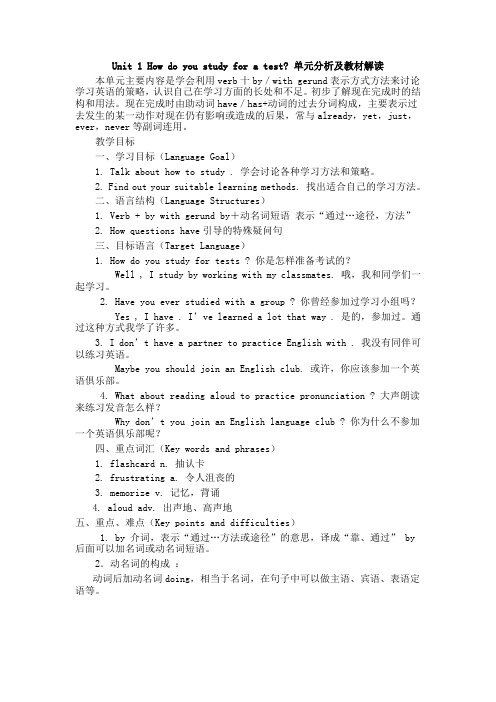
Unit 1 How do you study for a test? 单元分析及教材解读本单元主要内容是学会利用verb十by/with gerund表示方式方法来讨论学习英语的策略,认识自己在学习方面的长处和不足。
初步了解现在完成时的结构和用法。
现在完成时由助动词have/has+动词的过去分词构成,主要表示过去发生的某一动作对现在仍有影响或造成的后果,常与already,yet,just,ever,never等副词连用。
教学目标一、学习目标(Language Goal)1. Talk about how to study . 学会讨论各种学习方法和策略。
2. Find out your suitable learning methods. 找出适合自己的学习方法。
二、语言结构(Language Structures)1. Verb + by with gerund by+动名词短语表示“通过…途径,方法”2. How questions have引导的特殊疑问句三、目标语言(Target Language)1. How do you study for tests ? 你是怎样准备考试的?Well , I study by working with my classmates. 哦,我和同学们一起学习。
2. Have you ever studied with a group ? 你曾经参加过学习小组吗?Yes , I have . I’ve learned a lot that way . 是的,参加过。
通过这种方式我学了许多。
3. I don’t have a partner to practice English with . 我没有同伴可以练习英语。
Maybe you should join an English club. 或许,你应该参加一个英语俱乐部。
4. What about reading aloud to practice pronunciation ? 大声朗读来练习发音怎么样?Why don’t you join an English language club ? 你为什么不参加一个英语俱乐部呢?四、重点词汇(Key words and phrases)1. flashcard n. 抽认卡2. frustrating a. 令人沮丧的3. memorize v. 记忆,背诵4. aloud adv. 出声地、高声地五、重点、难点(Key points and difficulties)1. by 介词,表示“通过…方法或途径”的意思,译成“靠、通过” by 后面可以加名词或动名词短语。
鲁教版九年级英语Unit1 教学设计
Unit1 教学设计1.书面评价:在学生两两合作和小组合作展示时,教师以书写“正”字的方式予以鼓励,激励学生的组与组间的竞争意识,最后汇总,看看哪个组表现最好;2.口头评价:教师要不吝啬自己对学生课堂表现的评价,用“Well done”“You did a good job”“I hope you can do better.”及时反馈学生的学习情况;课堂检测设计:课上检测:结合课时的重点句式:--When was it invented?--It was invented in 1876. --What is it used for?--It is used for talking to people. 最后在总结巩固时,出示相关练习题,让学生依葫芦画瓢,完成习题。
1.( ) When _____ the car ______?A. was, invented;B. is, invented;C. was, invent;D. is, invent2.( ) The tea was invented _____ ShenNong.A. withB. byC. onD. to3.( ) Is the key _______ for ______ the door?A. used, openB. used, openede, openD. used, opening课后检测:结合初中学业水平测试,精选被动语态习题,注重学生能力的拔高。
【202X黄冈】—Claudia, are you going to Jeff’s birthday party on Saturday?—Unless I ______.A. will be invitedB. am invitedC. was invitingD. invited【202X长沙】—I am afrai d that I can’t finish the task successfully.—Don’t worry. You ______ plenty of time to do it.A. will be givenB. giveC. will give【202X河北】T he pe t dog is warm and loving, It ______ as a daughter of my family.A. treatsB. treatedC. is treatedD. was treated【202X河南】When Tim _______ why he was late for school, he just kept silent.A. was askedB. askedC. was askingD. is asking【202X陕西】E very day, too much water _______ in ou r school. We should save it.A. is wastedB. wastesC. was wastedD. wasted【202X北京】A new hospital _______ in my town next year.A. buildsB. builtC. is builtD. will be built【202X南京】We’re sure that the environment in our city ______ greatly through our work in the near future.A. improvedB. was improvedC. has improvedD. will be improved【202X鄂州】—The meeting _______ because of the smog in Northern China last week.—Oh, it’s too bad! W e should take action to improve the air quality.A. put outB. was put outC. put offD. was put off【202X昆明】—_______ free breakfasts _______in all schools in China?—No, not yet. Only in the rural areas.A. Are; madeB. Do; serveC. Are; servedD. Do; make【202X湖北咸宁】—Food safety is very important.—So some rules ______ to stop people from polluting food.A. must makeB. must be madeC. must madeD. be made【202X重庆市B】Keep quiet, please! Talking _______ during the meeting.A. is not allowedB. is allowedC. doesn’t allowD. allows【202X杭州】To my great surpri se, the famous athlete’s story ______ differently in the newspapers.A. was reportedB. reportedC. was reportingD. reports教师的职务是‘千教万教,教人求真’;学生的职务是‘千学万学,学做真人’。
九年级英语Unit 1 What would you do 鲁教版
九年级英语Unit 1 What would you do? 鲁教版【本讲教育信息】一、教学内容:Unit 1 What would you do?(一)重点单词(二)重点短语(三)重点句型(四)中考真题二、知识总结与归纳(一)重点单词1. million2. medical3. worry4. permission5. knowledgeable6. rest8. correct9. burn10. hurt11. offer12. refuse13. helpful(二)重点短语1. what if2. not… in the slightest3. plenty of4. get along with5. let…down6. e up with7. e out8. rather than…9. hide… from(三)重点句型1. What would you do if you had a million dollars?If sb. did / were + 其他,sb. would/ should / could/ might +动词原形e.g. 1)If I were you, I would buy it.2) If he had time, he would go to the concert with you.2. This old man had a million dollars, and he gave it to charity.3. What ifeveryone elsebrings a present?e.g 1) What if we move the desk here?2) What if he doesn’t stay there?3) Do you have anything else to say?4) What else did you see?5) Please take away these dirty clothes and bring some clean ones.6) Please take an umbrella with you.4. Then I’m too tired to do well.e.g 1) He is too young to join the army.2) He was too excited to say a word.3) She ran too slowly to catch him.5. … dogs can be a lot of trouble.in troublee.g 1) She is in hopeless trouble.2) The boy is in trouble again, he has broken a window.6. Confident people aren’t afraid to speak in public.e.g 1) He came into the classroom with a confident smile.2) We are confident of success.confidence n. 信任、信心e.g. 1) I have little confidence of him.2) The girl answered the question with confidence.in public 公开的,当众e.g. 1) Have you ever spat in public?2) He is not used to speaking in public.7. I’d invited him/ her to have dinner at my house.e.g. 1) Thank you for inviting me.2) I invite her to have coffee.3) Why didn’t you invite him in?8. Social situations don’t bother you in the slightest.e.g. 1) I’m sorry to have bothered you.2) I often bothered him with questions.3) You don’t bother me in the slightest.4) —Do you mind if I open the window?—Not in the slightest. Please do.9. You have plenty of friends.e.g. 1) There are plenty of people out of work.2) We have plenty of time to do the work.10. Your friends would probably say that you are easy to get along with.e.g. 1) She is easy to get along with.2) He is getting on (along) well with his classmates.3) How are you getting on (along) with your work?4) How are you getting along with your Chinese study, Jack?11. You like talking to one or two people rather than to a group.e.g. 1) They ran rather walk to school.2) Mary, rather than her classmates, is going to Shanghai.3) He is a student rather than a teacher.4) They lost books rather than money.5) I prefer to go in spring rather than in autumn.12. You would also rather stay at home and read a good book than go to a party.e.g. 1) I’d rather just lie on the beach.2) I would rather walk there than take a bus.3) I would rather go out for a walk than watch TV at home.13. I can’t think of any good advice to give her, but you always e up with good solutions to people’s problems.e.g. 1) At last, he came up with a good idea.2) She can e up with an idea when we don’t know what to do.3) They came up with the climbers at the top of the mountain.(四)中考真题同步要点1. 表示与现在事实相反的虚拟语气,谓语动词的表现形式是:主句用would / should / could / might + 动词原形,从句用动词的过去式(be的过去式一般用were)。
英语:鲁教版九年级Unit1《what would you do》(课件)
next
A task
• What would you do if you were a teacher/sportsman/singer/monitor /president?
Summary:
put the money in the bank
next
Listening text 1b
Girl1: Her article? An old man had a million dollars. And he gave it to charity. Boy1: Wow, what a nice man! Girl1: What would you do if you had a million dollars? Boy1: If I had a million dollars, I’d give the money to the zoo. I want to help the pandas. Girl1: That’s a good idea! I know what I’d do. I’d buy a big house for my family. Girl2: Really? I’d put the money in the bank. Then I’d just watch it grow! Boy2: Hmm… I think I’d give the money to medical research. I’d want to help other people.
have •If you _______(have) something important, you can go _________( can go) now. has •If he __________(have) no time, let’s ask Tom instead. comes •If she ______________(come), please tell me. were would choose •If I _________(be) you, I ___________(choose) this one.
九英单元教材分析
九年级英语单元教材分析Unit 1 How do you study for a test ?一、单元分析及材材处理本单元是初中三年级第一单元,以怎样学习为中心话题,让学生学会谈论学习方法,学会谈论学习中遇到的困难,学会针对学习中的困难,给别人提建议以及学会评价学习方法。
通过本单元的学习,学生了解了很多学习方法,并结合自己的实际情况采用适合自己的方法学习,为今后的学习提供了帮助。
三.教学方法:任务型教学法,情景交际法Unit 2 I used to be afraid of the dark.一、教材分析本单元的核心话题为“运用used to +动词原形”谈论自己和他人过去的情况,主要谈论自己和他人过去的外貌\性格\爱好,通过观察图片、听力理解等训练方式和独立学习、合作交流、完成任务等形式完成学习目标,以句型“Used to+动词原形”为主要学习任务,并且设置任务型综合性语言实践活动,让学生在交际活动中,学会如何正确地用英语表达自己的意见和建议。
三,重点和难点重点:学习描述人物外貌和性格的单词和学习、运用“used to +动词原形”这个句型。
难点:学生运用“used to + 动词原形”以口头问答的形式谈论同学过去的情况。
四.教材处理:根据以上对教材的分析,针对学生学习外语存在一定困难的实际情况。
我通过直观的图片来引导学生学习并在一些重点知识教学过程中适当运用汉语来解释这些知识,学习重点单词和句子时,我坚持多带学生读,让学生通过多读来更好的认知,学习听力内容时我也适当的降低学习难度,最后通过口头对话对学生所学知识点进行训练,从而达到运用和巩固知识的目的。
五、教学方法:适当降低难度,精讲多读,由浅入深,由易到难,循序渐进地教学。
六、学习方法:1)课前预习。
2)课堂认真听讲,养成好习惯;提高学习效率。
3)复习巩固,拓展新知。
Unit3 Teenagers should be allowed to choose their own clothes.一、教材分析本单元所涉及的内容是含有情态动词的被动语态,被动语态是本书当中比较重要的一部分,它把学生由以前所能够进行的主动语态的表达延伸到被动语态的学习和运用。
- 1、下载文档前请自行甄别文档内容的完整性,平台不提供额外的编辑、内容补充、找答案等附加服务。
- 2、"仅部分预览"的文档,不可在线预览部分如存在完整性等问题,可反馈申请退款(可完整预览的文档不适用该条件!)。
- 3、如文档侵犯您的权益,请联系客服反馈,我们会尽快为您处理(人工客服工作时间:9:00-18:30)。
Unit1教材分析
1.教学内容:本节课是鲁教版九年级英语第一单元的阅读内容,是本单元前三部知识的升华,是单元教学的延续。
本节课主要讲解篮球的发明、发展情况。
2.新课标指出,教学目标应包括知识与技能目标,过程与方法目标,情感与态度目标这三个方面,而这三维目标又应是紧密联系的一个有机整体,学生学会知识与技能的过程同时成为学会学习,形成正确价值观的过程,这就告诉我们,在教学中应以知识与技能为主线,渗透情感态度价值观,并把前面两者充分体现在过程与方法中。
借此,我将三维目标进行整合,确定本节课的教学目标为:
(1)知识目标:帮助学生学习,掌握本课新单词,理解课文内容。
(通过本节课的教学,使学生掌握课文当中出现的重点词,词组的用法,以及运用本单元的阅读策略来理解课文,尤其是将本单元被动语态融合在极其真实的语境中,有助于学生进一步理解其结构,掌握其用法。
)
(2)能力目标:提高学生英语交际能力,培养学生利用脑中构图扑捉文章信息的能力。
(3)情感目标:通过本课学习使学生懂得人类的科学发明创造了丰富的物质文明。
培养学生的创造发明的能力和愿望。
3.教学重点:培养学生阅读理解能力,以及运用英语完成指定任务的能力。
4.教学难点:学生运用英语交流信息,获取信息能力的提高。
